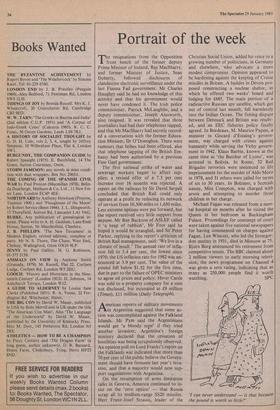Portrait of the week
The resignations from the Opposition front bench of the former deputy Prime Minister of Ireland, Ray MacSharry, and former Minister of Justice, Sean Doherty, followed disclosures of clandestine electronic surveillance under the last Fianna Fail government. Mr Charles Haughey said he had no knowledge of this activity and that his government would never have condoned it. The Irish police commissioner, Patrick McLaughlin, and a deputy commissioner, Joseph Ainsworth, also resigned. It was revealed that three journalists had had their telephones tapped, and that Mr-MacSharry had secretly record- ed a conversation with the former Educa- tion Minister, Dr O'Donoghue. There were rumours that bribes had been offered, also that telephone tapping of the British Ein-• bassy had been authorised by a previous Fine Gael government.
The first national strike of water and sewerage workers began to affect sup- plies; a revised offer of a 7.3 per cent increase over 16 months was rejected. A report on the railways by Sir David Serpell concluded that British Rail could only operate at a profit by reducing its network of services from 10,300 miles to 1,630 miles. Less extreme options were put forward, but the report received very little support from anyone. Mr Ray Buckton of ASLEF called it 'a heap of rubbish', Mr Foot said he hoped it would be strangled, and Sir Peter Parker, replying to the report's criticism of British Rail management, said: 'We live in a climate of insult.' The annual rate of infla- tion fell to 5.4 per cent, the lowest since 1970; the US inflation rate for 1982 was an- nounced at 3.9 per cent. The value of the pound fell below $1.52 for the first time, due in part to the failure of OPEC ministers to agree oil prices and policy. Hever Castle was sold to a property company for a sum not disclosed, but estimated at £9 million (Times), £1I million (Daily Telegraph).
American reports of military movements in Argentina suggested that some ac- tion was contemplated against the Falkland Islands. Mr Pym said the Argentinians would get 'a bloody nose' if they tried another invasion; Argentina's foreign ministry declared that the cessation of hostilities was being scrupulously observed. An opinion poll on Lord Franks's report on the Falklands war indicated that more than 70 per cent of the public believe the Govern- ment should have foreseen last year's inva- sion, and that a majority would now sup- port negotiations with Argentina.
On the resumption of arms limitation talks in Geneva, America continued to in- sist on the 'zero option' - that Russia scrap all its medium-range SS20 missiles. Herr Franz-Josef Strauss, leader of the Christian Social Union, added his voice to a growing number of politicians, in Germany and elsewhere, who advocate a more modest compromise. Opinion appeared to be hardening against the keeping of Cruise missiles in Britain. A builder in Devon pro- posed constructing a nuclear shelter, in which he offered two weeks' board and lodging for £685. The main portion of a radioactive Russian spy satellite, which got out of control last month, fell harmlessly into the Indian Ocean. The fishing dispute between Denmark and Britain was resolv- ed, and an EEC fisheries policy finally agreed. In Bordeaux, M. Maurice Papon, a minister in Giscard d'Estaing's govern- ment, was charged with crimes against humanity while serving the Vichy govern- ment in 1942. Klaus Barbie, known at the same time as 'the Butcher of Lyons', was arrested in Bolivia. In Rome, 32 Red Brigades terrorists were sentenced to life imprisonment for the murder of Aldo Moro in 1978, and 31 others were jailed for terms of six to 30 years. In Bolzano, a Scottish nanny, Miss Compton, was charged with arson and attempting to murder three children in her charge.
Michael Fagan was released from a men- tal hospital six months after he visited the Queen in her bedroom at Buckingham Palace. Proceedings for contempt of court were taken against five national newspapers for having commented on charges against Fagan. Len Wincott, who led the Invergor- don mutiny in 1931; died in Moscow at 75. Bjorn Borg announced his retirement from competitive tennis. The BBC claimed about 2 million viewers to early morning televi- sion; the news programme on Channel 4 was given a zero rating, indicating that as many as 250,000 people find it worth
can never understand -, is that because the pound is worth so little?'






































 Previous page
Previous page